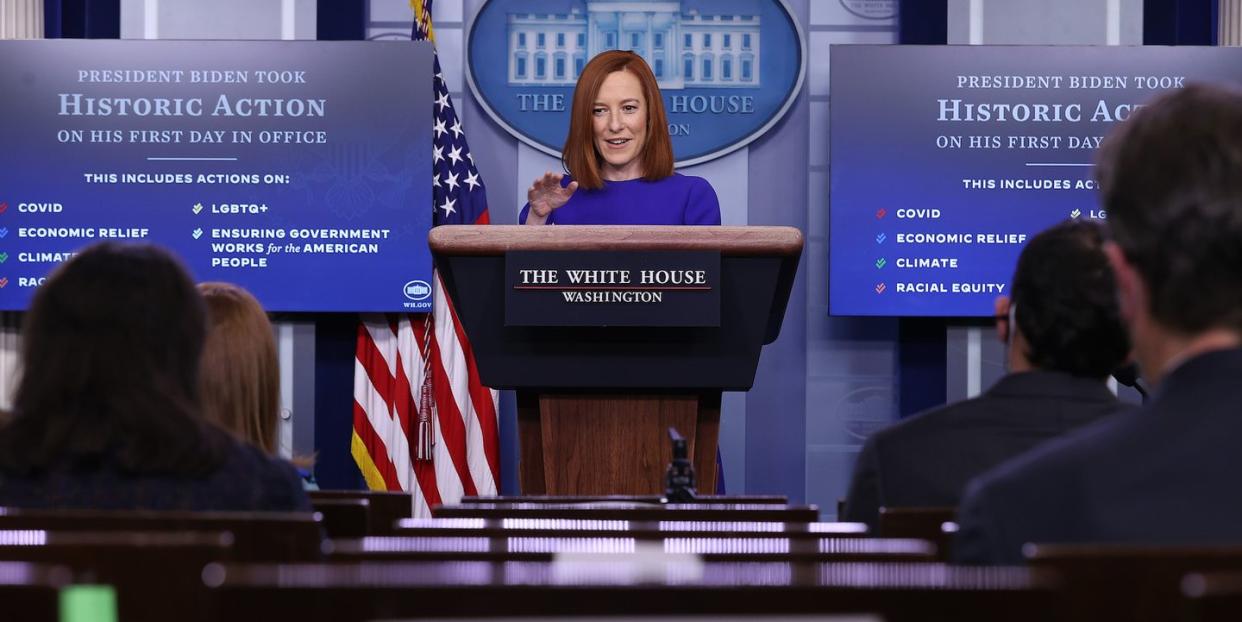Newly Sane White House Briefings Will Offer the Press a Chance to Reimagine the Job

Wednesday's White House Press Briefing was a genuinely disorienting experience. The new Press Secretary, Jen Psaki, did not spend the lion's share of the briefing engaging in some kind of darkly ritualized combat with the assembled reporters. Does she not get that the job is to wage war on The Fake News Media to please the audience of one watching live from another room in the same building? "I have deep respect for the role of a free and independent press in our democracy, and for the role all of you play," said Psaki in her first day on the job. "There will be moments when we disagree, and there will certainly be days where we disagree for extensive parts of the briefing even, perhaps. But we have a common goal, which is sharing accurate information with the American people."
This is a far cry from her immediate predecessor, Kayleigh McEnany, who regularly demonstrated that the Trump White House simply did not feel it was accountable to the public at all. Their power was nominally derived from the will of the people, but they did not feel obligated to explain or justify the things they did in the name of the United States of America. They did not see themselves as servants of the public, who put them there and paid their salaries. This culminated with McEnany's suggestion to CNN's Kaitlan Collins in September that if she wanted to know any details about Trump's Definitely Real Healthcare Plan—one which, if it had actually existed, could have affected the lives of tens of millions of Americans—then Collins should "come work here at the White House." What?
Yes, Psaki got immediate praise for not behaving like a complete freak, and fair enough. That's the bar at the moment. She dodged questions like whether President Biden has confidence in FBI Director Christopher Wray, who took a mauling under the previous regime, and the press will have to gear up to deal with this kind of evasion of accountability. It is not somehow Good when the administration shirks transparency more politely. That said, when Psaki responded that she hadn't yet had time to discuss some issue or another with the president, it seemed fairly plausible: they'd been in the job for just a few hours.
But another thing the press will have to consider is how to cover the coming battles between the Biden White House and the various Republican minority caucuses in Congress. We got a look at one way this may play out with two consecutive questions from White House reporters on the COVID relief bill Biden is seeking.
The premises of these two questions are factually accurate: Mitt Romney has said there's no need for a new bill, and Lindsey Graham has suggested the $1.9 trillion price tag is too high. Joe Biden has said he wants to attract bipartisan support to pass the bill through regular order, rather than budget reconciliation, which would require a simple majority that Democratic senators can supply. But when we're talking about a relief bill during a generational crisis, is the primary concern what Republican senators have said about it, or whether the bill will provide the right relief to people who need it? And further, does the wrong choice of framing allow one party in the discussion to avoid accountability?
We learned Thursday morning that 1.4 million Americans filed for unemployment last week, among the biggest jumps since August, which brings the number of unemployed citizens to around 16 million. As Psaki rightly pointed out in her second answer, the bill is made up of component parts, each of which is meant to be targeted to major problems we face—the unemployment crisis, vaccine distribution, the looming eviction cataclysm, the hunger epidemic, millions uninsured during a global pandemic. If various Republican senators think Biden is proposing we spend too much on any of these particular initiatives, they should have to say so specifically. Handwringing about the overall price tag—which is still less than the one for the Tax Cuts for Rich People and Corporations that Republicans recently passed during an economic boom—is not really valid here. The National Debt is not a pressing concern right now, even if Republicans have quickly rediscovered their concern about it now that a Democrat is president.
Get unlimited access to all of Esquire’s political coverage.
Join Esquire Select
Put simply, this is not a political party whose members can any longer be assumed to be acting in good faith. It's home to Ted Cruz, who followed up his ludicrous appearance at the inauguration by greeting the news that the United States had re-entered the Paris climate accords—we were, thanks to Donald Trump, the only fucking country in the world to leave it—by trotting out a canned line about how Joe Biden cares more about Paris than Pittsburgh. This first of all demonstrated the outright disdain Cruz has for his audience, whom he clearly considers stupid marks: the significance of "Paris" in the agreement is limited to the name, though Cruz is hoping to activate lizard-brain reactions towards anything French. But there's also the small matter that Cruz just finished trying to erase the votes of people in Pittsburgh. That was part of his larger effort to throw out to the results of the election in Pennsylvania, disenfranchising millions of his fellow citizens to install Donald Trump in power in contravention of the will of the people. You know, American Patriot shit.

Maybe we in The Fake News Media should frame our questions and coverage around what is actually needed out in the country. We can incorporate Republicans' often arbitrary grievances—which a true cynic would suggest are, in true Mitch McConnell style, meant to hamper the economic recovery under a Democratic president for their own political gain—but are they the only other relevant datapoint to what the White House is proposing here? Maybe we should arrange these discussions less in terms of political fights between the two parties, and more in terms of whether the government is delivering what is needed for people right now—people who otherwise would have no voice in how policy is made. That is a big part of the job, even if you think political journalists don't always live up to it. It's not a failure of journalism to point out one party's position is a better reflection of what is required in reality.
As Bernie Sanders put it in an interview this week, "It's not a question of the middle, it's a question of responding to the crises." The Middle is not real. It's made up. And framing discussions this way is a gift to bad-faith actors who are not interested in evaluating the relief bill on the merits. Drawing the out-of-bounds lines of the game this way provides aid and comfort to elected representatives who, in a time of crisis, are not prioritizing the material needs of their constituents. Already, many on the right are suggesting that Joe Biden making policy changes in accordance with the promises he ran on is somehow hypocritical because he is also calling for national unity. These people are not honest, and media coverage should reflect that. Ideally, it would also reflect that there are more considerations in a policy debate than what Republicans said yesterday.
You Might Also Like

